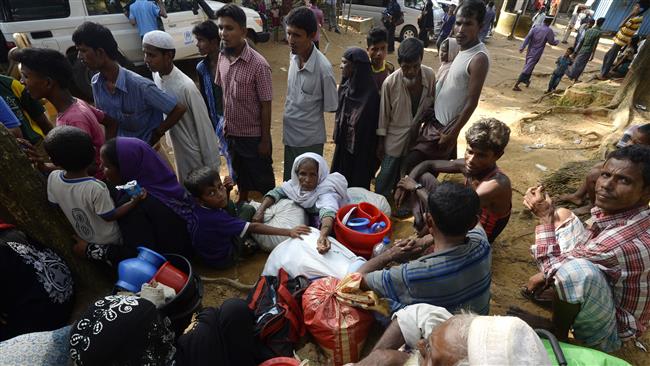
The wet weather is expected to start in late March and aid agencies fear thousands of houses precariously perched on dusty hillsides could be washed into the valley below, which in turn could fill with stinking and stagnant water.
Richard Evans from the UNHCR estimated at least 20% of the camp could be at risk, stressing that "People are calling this the emergency within the emergency".
"The numbers are staggering, it’s a 100,000 people out of 560,000 people who will be directly impacted from the flooding and the landslip but don’t forget that fire is a huge risk, don’t forget communicable diseases is a huge risk," he said.
A senior United Nations official has also stressed that it is not yet safe for thousands of Rohingya Muslims living in refugee camps in Bangladesh to begin returning to Myanmar's Rakhine state.
The deputy executive director of the United Nations Children's Fund (UNICEF), Justin Forsyth, said in the Bangladeshi capital Dhaka on Thursday that issues surrounding safety of the Rohingya needed to be addressed before their repatriation.
Bangladesh and Myanmar agreed to repatriate the hundreds of thousands of Rohingya Muslims who have fled a recent army crackdown in Myanmar within a period of two years.
The United Nations refugee agency stressed that Rohingya Muslim refugees in Bangladesh should be consulted and ensured of their safety before they are repatriated to Myanmar’s Rakhine state.
Concerns are growing among United Nations agencies and humanitarian groups over an agreement between the Bangladesh and Myanmar governments to repatriate several hundred thousand Rohingya refugees within two years.
The UN secretary general, Antonio Guterres, said the repatriation deal needed to clarify whether Rohingya would be permitted to return to their homes or live in specially built camps.
“The worst would be to move these people from camps in Bangladesh to camps in Myanmar,” Guterres stressed.
The deal included no role for the UN refugee agency, he added, making it difficult to “guarantee that the operation abides by international standards.”
Amnesty International described plans to return the Rohingya refugees in Bangladesh as “alarmingly premature.”
More than 655,000 of Myanmar's Muslim minority have fled across the border to Bangladesh since late August when the Myanmar army launched a sweeping crackdown on Rohingya Muslims in Northern Rakhine state.
The UN has already described the Rohingya as the most persecuted community in the world, calling the situation in Rakhine similar to “a textbook example of ethnic cleansing.”
The Myanmarese government, however, denies committing atrocities against the Rohingya people and has even rejected UN criticism for its “politicization and partiality.”
UN High Commissioner for Human Rights Zeid Ra‘ad al-Hussein stressed that attacks on the Rohingya had been “well thought out and planned” and he had asked Myanmar’s de facto leader to do more to stop the military atrocities.
847/940